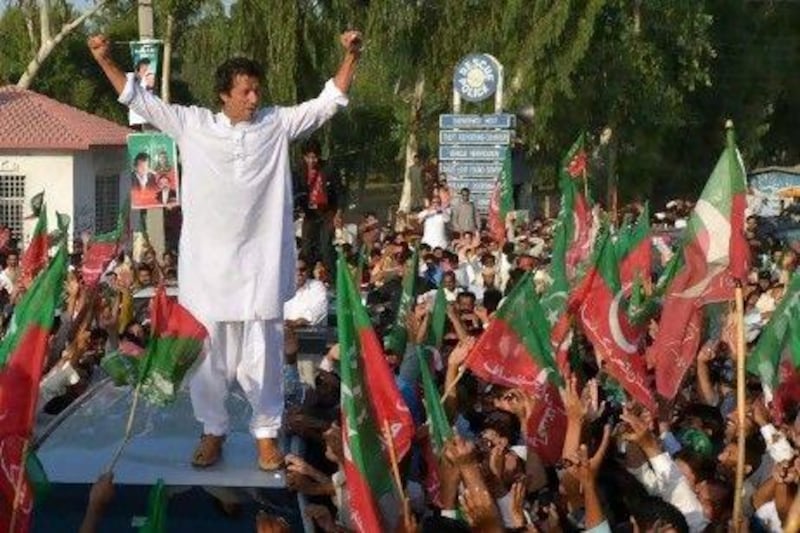ISLAMABAD // Imran Khan may have failed to hold an anti-drone protest in Pakistan's north-western tribal belt, but his unprecedented action has tapped popular sentiment and could bolster his waning popularity.
The Pakistani government and opposition leaders have been vocal in opposing the drone attacks by the United States, which they say have killed many innocent civilians. But no leader has taken such a high-profile stand against the strikes as Mr Khan, the cricketer turned politician, whose "peace march" attracted throngs of people including a contingent of western peace activists.
The march, which included hundreds of vehicles, started in Islamabad on Saturday and wound its way through the towns and villages in central Punjab province and the north-west for more than 400 kilometres.
On Sunday, Pakistan's military halted Mr Khan and thousands of his supporters from entering South Waziristan on the border with Afghanistan to hold the protest, saying it was too risky for them to venture into the militant-infested region.
While the abandonment may have disappointed many of Mr Khan's supporters, analysts said the public interest in the anti-drone campaign by holding the march could help the charismatic leader drum up support for his political party, Tehrik-e-Insaaf, or Movement of Justice, ahead of general elections due early next year.
"He will organise more such marches to keep up this momentum," said Hasan Askari Rizvi, a Lahore-based political analyst. "He will try to give an impression through these rallies that his party is alive and kicking and is a big threat to his opponents."
Mr Khan, 59, has been involved in Pakistani politics for the past 15 years. But it was not until last year that he became a serious political figure after staging a series of large rallies across the country, partly because of growing disillusionment with mainstream political parties led by the Pakistani president, Asif Ali Zardari, and his main rival and the former prime minister, Nawaz Sharif.
However, a recent survey conducted by the Washington-based International Republican Institute, which advances freedom and democracy worldwide, showed that Mr Khan's popularity had fallen by 22 per cent since last February.
Internal fighting in his party and the introduction of allegedly corrupt and inefficient politicians in its ranks have dented his popularity to a large extent.
Shireen Mazari, the central vice president of the party, resigned last week from her post as well as from the basic membership of the party, saying it had been "hijacked by fuedals".
But Mr Khan's campaign placed the international media spotlight on the US campaign, although Washington is unlikely to change its course given the successes it says have been achieved by the strikes.
"Imran Khan could not make it to South Waziristan but he has been successful in highlighting the drone issue in international media by holding this march," said Rahimullah Yusufzai, editor of the The News International based in Peshawar. "It's a good achievement for him."
Mr Khan, who led the Pakistan team to Cricket World Cup glory in 1992, has been nicknamed "Taliban Khan" by his liberal opponents, who say he was not as outspoken against the Taliban's bomb and suicide attacks that have also killed hundreds as he was against the US drone campaign.
Mr Khan also seemed to have tried to throw down a political gauntlet to Islamist groups by staging an anti-US rally in a region that has traditionally been their stronghold, analysts said.
Throughout his journey, Mr Khan criticised Fazal-ur-Rehman, one of Pakistan's top politicians, in an apparent attempt to garner support from ethnic Pashtun tribes, many of whom had been supporting hardline Islamist groups in the polls.
"Imran Khan's party is not the party of mullahs but it is politically right and Islamist in orientation, and that's why he is trying to win the support of voters with religious leanings," Mr Rizvi said.
But Mr Yusufzai said it was too early to say whether Mr Khan would be successful in denting the support of hardline clerics in the north-west.






